
How to stop being angry with your kids, how to stop shouting at your kids, how to stop being stressed and frustrated with your kids, is not easy. Many mothers, Muslim or not, struggle to be patient and calm with their children. You are not alone.
Our beloved Prophet ﷺ dealt with children in a merciful and compassionate way. He loved them and they loved him in return. But how can we, as Muslim parents, achieve something similar with our children? How can we stop being angry with our children?
After all, your toddler won’t stop whining, your 10-year-old keeps bugging you whilst you’re on the phone and your teenager just won’t ever listen to anything, you ever say.
I get it. Parenting is so, so hard. You don’t have much support, your to-do list is never ending, and you have to lug around the great weight of guilt, for every time you shout, become agitated, punish or even hurt your child.
You know you want to stop being angry with your kids. You don’t want to lose it and be angry with your children. You know it’s damaging them and causing them to fear you. It’s breaking the bonds between you, making them lose respect for you and going to affect their future relationships as adults too.
But nevertheless, you feel the fire building inside, you try to hold it in but it’s not long before it forces its way out, unleashed, leaving damage and destruction in its path.
And then when the fire dies down, or as your kids fall asleep, guilt shadows you, as you subconsciously wrestle with your thoughts. “How can you get so angry at your kids”, “why couldn’t you control yourself better?” “You’re Muslim! Anger is haram!” “How could you basically, abuse your kids like that? You’re such a fraud…”
How to Stop Being Angry With Your Kids
1. Stop & Breathe
The first port of call when trying to stop being angry with your kids is to look at what is physiologically happening to you: Think about the times you struggle to manage your anger, are your:
- fists curled up?
- teeth clenched?
- heart racing?
- muscles tense?
- face frowning?
Are you holding your breath?
Whether at the time of lashing out or in the aftermath of anger, when your mind is over-ridden with guilt and now anger at yourself; adrenaline and cortisol (stress hormone) are pumping through your body.
To stop being angry with your kids, the first step is to become self aware. The faster you notice whats happening to you physically as you become angry, the faster you can deal with those symptoms and regain control. To do this you must learn how to breathe through your diaphragm. Breathing through your diagphragm reduces the release of stress hormones in your body. Continue to breathe like this until the physiological (physical) symptoms listed above, have eased off.
Learn to do diaphragmatic breathing here:
Learn how to breathe for instant stress-relief
It is extremely important at this time, to also seek refuge from Shaytan, by making isti’aadha (saying):

Making isti’adha is vital when trying to stop being angry with your children because a calm Muslim is productive and successful. Therefore, a calm Muslim parent is completely in opposition to the aims of Shaytan as his goal an promise to Allah is to weaken us so that he can take us as far from Islam and Allah as possible.
Acting upon anger opens the doors to Shaytan, as we give up self-control, lash out at our children and inhibit ourselves from raising a healthy family.
If you find it difficult to calm down, try sitting or lying down (if you can). Attempt to relax all your muscles to the best of your ability, whilst continuing to breathe, and focus your mind on adhkaar (zikr/words of remembrance). Think of these as, what self-help gurus call, your ‘words of affirmation’. Only these words are far more powerful, because with them, you relieve your struggles to Allah, trusting and relying on Him to help and assist you.
And believe me, He will.
2. Let your Child Know How You’re Feeling
In the heat of anger, your children don’t just disappear, and more often that not, you can’t just walk out of the room to cool down.
Breathing is extremely effective, but if your cup is empty and you’ve been under stress for extended periods of time, what you desperately need to know is:
What can I say or do instead of shouting and hitting?
You need an alternative to cruel words and heavy hands. An exchange, because acting on your anger started from a desperate place and stayed on to become a bad habit. You need to swap it for a good habit which harnesses your anger, and allows you to express your intense, negative feelings, in an unharmful and non-toxic way.
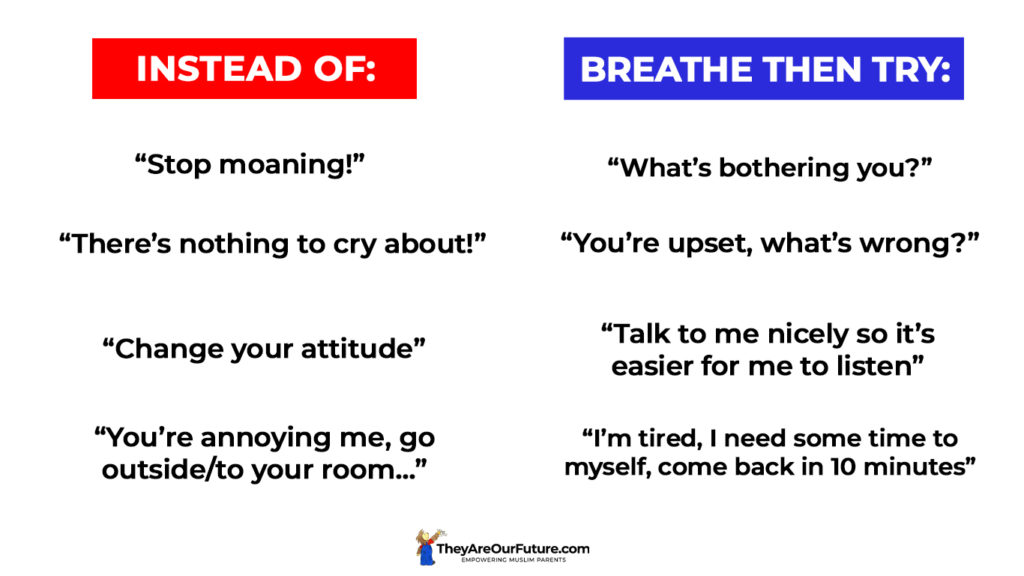
If you’re anger is more intense, try:
These suggestions give you time to combat the adrenaline and cortisol rushing through your body. You’re also modelling to your child, how to manage natural feelings of anger. Alhamdulillah 🌿
Once you’re calm, or whilst you’re calming down, focus your thoughts on problem solving and rationalising the situation which made you angry. Your kids misbehaving is normal. Especially if they feel disconnected. And perhaps your anger has nothing to do with your children at all…?
3. Look at Your Child Another Way

Now that firefighting is done with, you’ve calmed down and are able to return to being with your child (both physically and mentally), look at them.
Look at their small hands, hair, feet, cheeks, eyes, bodies…
- What are they doing?
- What are they thinking?
- How are they feeling?
- Are they happy or scared?
- Anxious? Worried?
Perhaps they slammed the door, hit their sister and denied it, lied through their front teeth or spouted rude remarks at you.
It won’t be long before you lose it again. After all you can’t change or control your children with breathing and calming down…
But you can change and control yourself.
- What if you changed the way you thought of your children or their behaviour?
- What if you realised children behaved the way they did, for a reason?
- There was a trigger?
- There were multiple triggers?
- They were tired or bored, experimenting or intrigued, curious or imaginative?
- What if they were having a hard day?
- Being bullied at school, feeling lonely, misunderstood, jealous or angry?
Children behave the way they do for a reason. We all behave the way we do, for a reason.
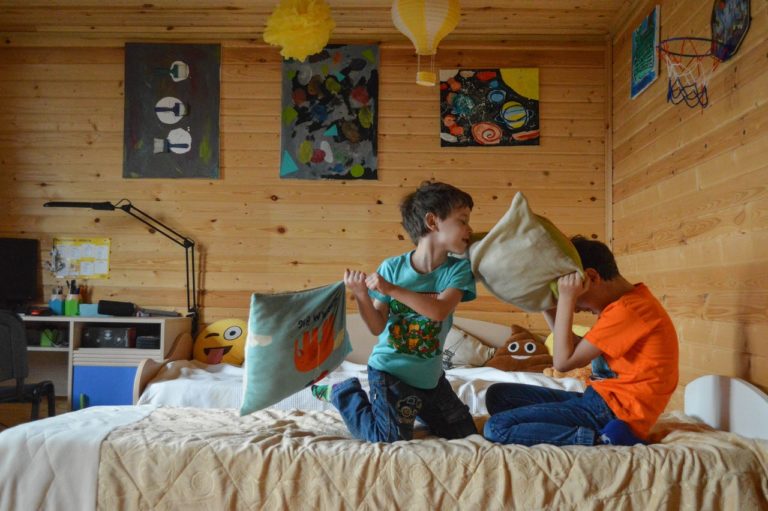
4. Understand Your Child’s Behaviour
Parenting is a relationship with your child. You are two people in a relationship – where you are the mature mentor and they are the unskilled apprentice.
Look behind the outward behaviours and cemented labels of your child:
They are not ‘naughty’, perhaps they are frustrated, exhausted or feeling disconnected?
They are not ‘rude’, perhaps they don’t have the skill to express themselves in an appropriate way or perhaps they have lost respect for you?
They are not ‘stubborn’, perhaps they are simply committed to what they want?
And maybe they are not ‘easily distractible’, but just extremely perceptive, intrigued and curious?
When children feel misunderstood, unheard and disconnected from their parents, they act out. But often we see age-appropriate, natural behaviour as a problem too.
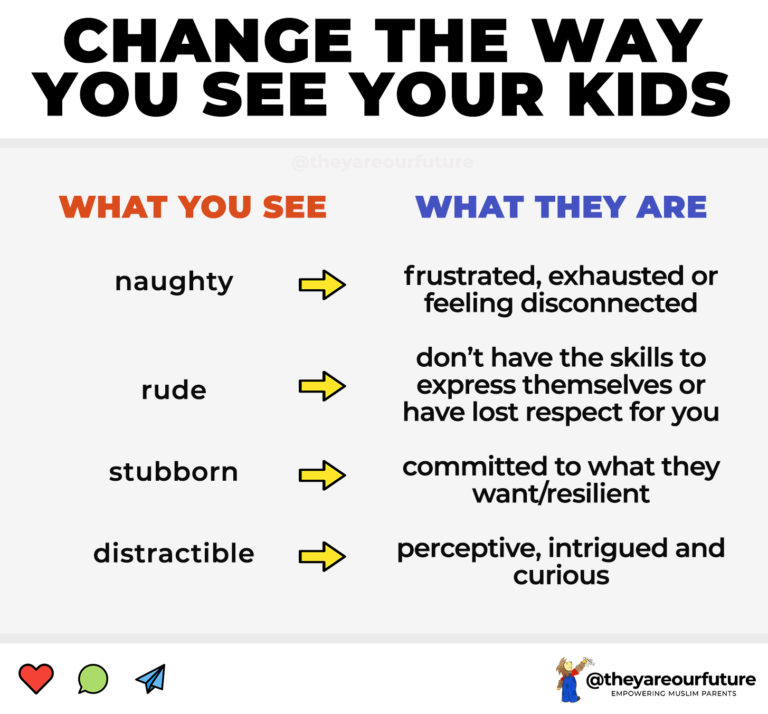
To break the cycle of anger in your home, you must have mercy with your child and try to understand them.
Lower your wings of love and compassion to them. Look for the true reason behind their actions, then address and communicate to them in a calm and respectful way:
Offer alternatives:
“We don’t write on the walls baby, we write on paper, here use this”
Show empathy (Understanding):
“You must be feeling pretty rough to slam the door so hard, if you want to talk, I’ll try to be a good listener”
Recognise their patterns (Emotional Inuition):
“Looks like you’re too tired to continue playing together, come let’s sit and read a book on the sofa”
Teach them how to express themselves without harming others:
“Tell your sister how you’re feeling with your words not your hands. We don’t hit or hurt each other.”
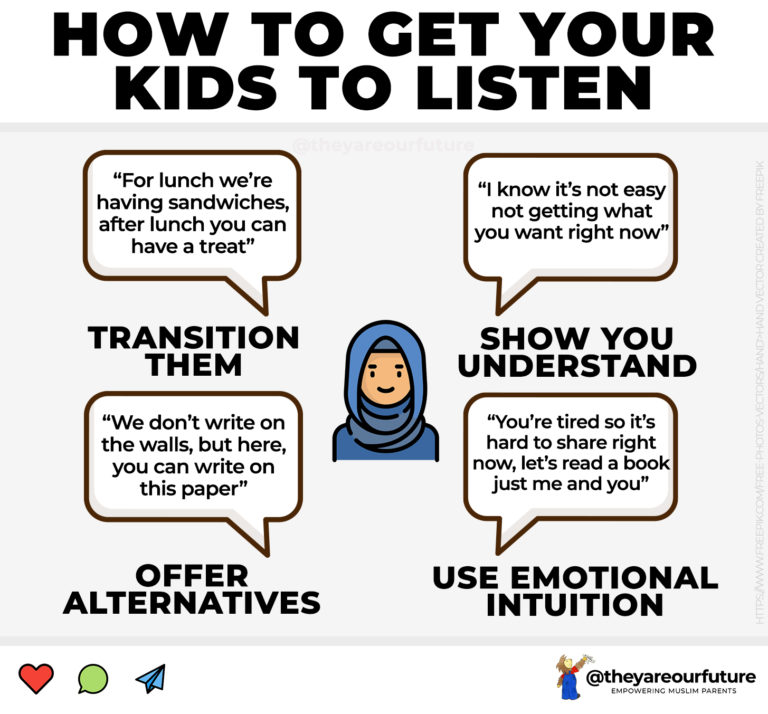
Spend time watching your children, instead of a screen, and figure out:
- what makes them tick?
- what drains them?
- what re-charges them?
- what do they enjoy?
- what don’t they like?
- how are they feeling?
- what might they be thinking right now?
- why did they choose to do that?
Understanding your child’s behaviour will make it so much easier for you to keep your cool when you get triggered and becoming more connected, will help you to stop being angry at your kids. InshaAllah.
5. Know Your Triggers

How we parent on autopilot, our default, our habits; are formed from our own childhoods, our experiences, trauma and emotional neglect. I talked about getting to the root of your anger in my last article ‘How to Get in Control of Your Anger for Good”. Identifying and understanding your triggers leads us to know what work needs to be done before we can be free from anger and its control.
- What are your triggers?
- What makes you angry at your kids?
This explained why now as a mum, I couldn’t stand it when my child moaned. It triggered my own childhood experience and made me unfairly and unnecessarily angry.
Aside from childhood-based triggers, there are often more simplistic reasons for our triggers too. Think about the situations in which your stress and inevitably anger, starts to build. The kids being unable to find their shoes when it’s time to leave the house perhaps, or having to think and plan the meals every day or having to cope with the all of the housework on your own? If you can recognise what’s triggering your anger, you are able to do something about it.

6. Problem Solve
After highlighting what triggers you to be angry at your kids, work out suitable solutions. This could mean sitting down with your kids to respectfully let them know what’s bothering you.
For example, if you would like your older kids to start doing chores, perhaps say something like:
“When I have to do all the housework myself, I feel like no one cares about helping me or looking after the home. I need you to start helping out more. What chores could you take on?”
Then write a list of their ideas, and your ideas (without judging or rejecting straight away). Next go through each one, and explain what does and doesn’t work for you and why, until you are able to form a plan of action together.
When we treat our kids with respect and kindness, they mirror the respect back, trust us and become more connected.
Finding solutions to the triggers could also mean looking at what’s causing the problem and addressing that specifically. For example, if your kids take ages to find their shoes before leaving the house, perhaps you need to declutter the footwear you own as a family, put a basket near the front door for the most used footwear or keep reminding and insisting your children return their shoes to their designated homes as soon as they take them off.
Problem solving will reduce the build-up of stress and ultimately stop you from being angry at your kids.

7. Build Your Self-Love, Tawakkul & Blessings
I believe that if you are quick to get angry at your kids, then you must be going through, or have been through, a difficult time. You aren’t able to give your best to your kids right now but deciding to read this article shows your sincere intentions in wanting to achieve that.
I want you to know that, anger itself is not haram – only acting on it, is.
You are not swamped in sin from the very feeling of anger.
If you walk around feeling stressed and angry, you are not a bad mum. You just need help preventing anger from controlling you.
Implementing the advice mentioned in this article and making a habit of it, will definitely aid you in your journey, but there is another way to give you a boost.
As Muslims we must believe that our actions have effects on our lives – we can increase and decrease the blessings (barakah) we experience, through our choices.
If you are going through a difficult time and are struggling to find relief, then know that sincerely leaving that which displeases Allah and increasing in that which pleases Him, will make our du’a more likely to be accepted and our life to be filled with more barakah.
If you’re trying to do this already and are still suffering then please listen:
- MashaAllah, that is fantastic. You are being active in taking control over your own life. Well done for not wallowing in self-pity and excuses.
- Don’t give up, sometimes the test is simply a matter of patience and proving that you do fully put your trust and reliance (tawakkul) in Allah.
Lastly, make sure you’re keeping your cup full, you can’t keep serving everyone else if you have no chance to re-energise yourself. If you don’t know how to do this, you might want to take a read of my previous articles:
Final Thoughts

In this article I have listed and explained ways to stop you being angry with your kids. It’s reassuring to know parents want this information – they want to learn how to improve the relationship they share with their children, alhamdulillah
Nurturing ourselves & our children
To stop being angry with your kids requires managing and regulating your emotions. This is so vital in preventing trauma and building strong believers. Emotional skills should be amongst the first lessons we teach our children… and ourselves too.
We didn’t go to university or take courses to become parents, (-even though ironically it’s the most important job in the world,) but we are indeed raising human beings here – our future. These are little people who don’t only need to know how to write and do maths, or brush their teeth and put their clothes on. They need to know how to say ‘no’ when they feel uncomfortable, how to say and feel sorry when they’ve caused harm, how to express love and joy, how to make good friends, and how to help others and work together. Our children need to learn how to respect, value, understand, co-exist, inter-depend and take care of other people.
We need to know how to respect, value, understand, co-exist, inter-depend and take care of other people.
- How do we learn to maintain life-long relationships?
- How do we learn to understand and take care of emotions?
- How do we learn to understand and take care of emotions?
- How do we learn to manage people and their opinions, while taking care of our own?
- How do we learn to manage people and their opinions, while taking care of our own?
- How do we learn to create harmony over havoc and which words claim calm above chaos?
- How do we learn to create harmony over havoc and which words claim calm above chaos?
- Must we really learn these fundamental, yet incredibly vital skills haphazardly?
- Must we really learn these fundamental, yet incredibly vital skills haphazardly?
- Through trial and error or from the ashes of tragic failings?

Stop the Toxic Cycle
The bottom line when learning how to stop being angry with our kids is to learn how to take care of ourselves and each other. We need to live in loving and compassionate ways, which prevent harm and heal it too. We must educate ourselves and learn to create inter-dependant, respectful and caring families, in which everyone has room and support to blossom.
Learning how to stop being angry with our kids by overcoming its cause and managing it, is an act of ebaadah.
The Prophet ﷺ said, “He is not from us, who does not respect our elderly and be merciful to our young”
If we don’t overcome our toxic behaviours, if we cannot control our anger, we will continue the cycle of trauma and emotional neglect for generations to come. Because a
hurt people, hurt people…
Stop the toxic cycle.
Let’s Grow Together
I’m coaching and empowering an intimate group of ladies in my private group – Mothers of the Future.
Join Us
Get access to the group and the Mothers of the Future Audio Library.
Listen and re-listen to over 9+ hours (and building) of empowering, uninterrupted and ad-free audio teachings and trainings, created especially for struggling MUSLIM mothers seeking consistent change, once and for all.
No ads. No apps. Just pure quality audio advice and guidance you can trust.
Support me to Support You
Was this helpful?
Leave a comment or share with your mummy-friends to spread the empowerment!
Make sure you’re following me on Instagram @theyareourfuture for more parenting tips and resources.



![6 Steps to Control Your Anger for Good [Muslim Parenting]](https://usercontent.one/wp/www.theyareourfuture.com/wp-content/uploads/2020/04/georgia-de-lotz-HoD2lHLYhaw-unsplash-300x212.jpg)

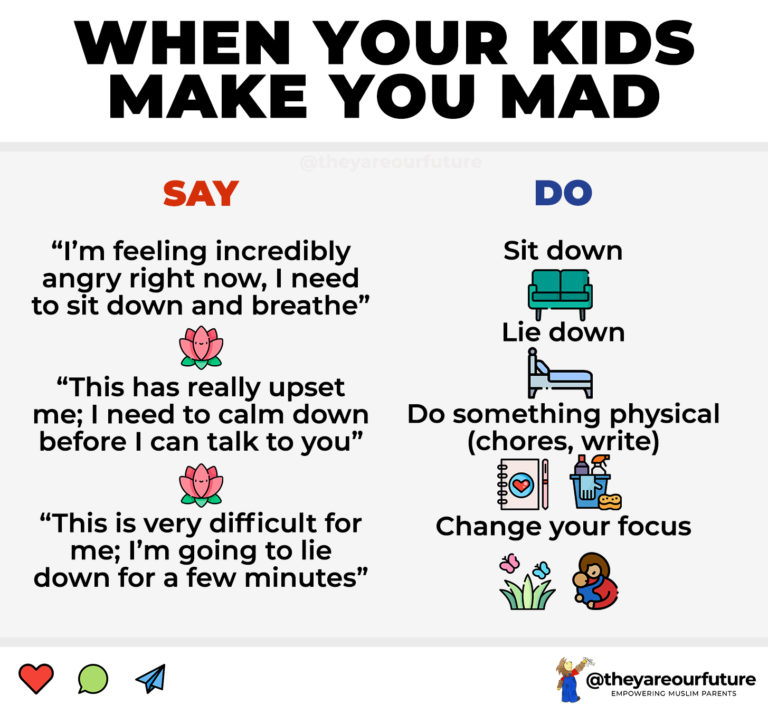
![6 Steps to Control Your Anger for Good [Muslim Parenting]](https://usercontent.one/wp/www.theyareourfuture.com/wp-content/uploads/2020/06/nature-summer-yellow-animal-55814-300x200.jpg)



Subhanallah such a lovely read and resonates with me so much ! Jzk for this thought provoking article
I just happened to stumble upon this article. And am glad I did it.
Or more like I feel Allah just directed me to this coz He knew I needed THIS now.
MashAllah ,May Allah put Barakah in whatever Ur doing and never stop doing this ❤️
Thank you so much i will try it, because i become too much anger with my child
Pingback: “How to stop being angry with your kids”. Amazing article. | U M Ū M M A